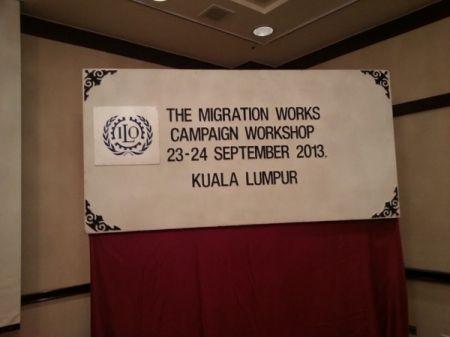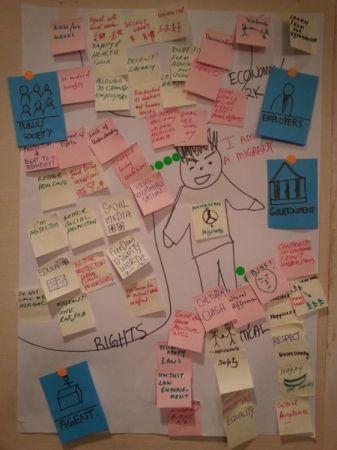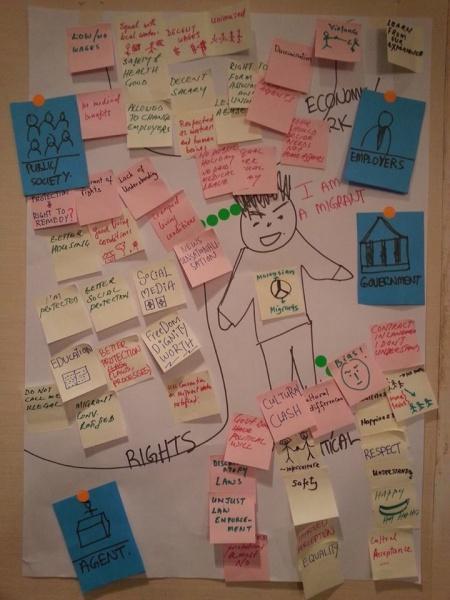Lee Jie Jiun is surprised by what she comes away with when she attends a workshop on migrant workers’ rights. She shares them with us here.
When I was eight, my schoolmates and I witnessed the school canteen operator hurl a plastic plate at a young Indonesian maid simply because she swept the floor in the wrong direction. What followed were vulgar remarks and the sound of weeping. As terrified as any eight-year-old would be, we quickly reported the incident to our teacher. The only response we received was Don’t be busybody lah!” And with that, gone were the days when we regarded our teachers as impeccable figures and blindly followed their instructions.
Growing up, I heard stories of how agencies and employers mistreat migrant workers via the confiscation of passports, cutting off contact with their family members, deprivation of basic human rights, flagrant abuse of labor law, etc.
As a university student who commutes by public transport, I have been repeatedly warned by my parents to be vigilant, especially around “foreigners”.
This is not not a new phenomenon, this “close-one-eye” culture, the exploitation and discrimination against migrant workers – all of this is dehumanizing, irrational and simply unthinkable.
A four-country study on public attitudes to migrant workers conducted by the International Labour Organization (ILO) in 2010 – which involved Malaysia, Singapore, Thailand, and South Korea –illustrated negative attitudes towards migrants. More than 80% felt that unauthorised migrants could not expect to have any rights at work. Equally disturbing is that more than 80% believed that migrants commit a high number of crimes (although a recent statement by a Minister has shown that approximately 1% of crimes are committed by foreigners).
Recently, I was honored to be invited by LexisNexis Malaysia to attend the Migration Works Campaign Workshop organised by the ILO. This workshop was part of the Tripartite Action to Protect Migrant Workers in the Greater Mekong Sub-region from Labour Exploitation (GMS TRIANGLE project) which aims to reinforce the formation and implementation of recruitment and labour protection laws and policies, to safeguard migrant workers in strict compliance with the rule of law.

All participants were divided into groups and required to enumerate positive and negative things about migrant workers — the former being traits such as being hardworking, patient, enduring, contributing to the economy, and multiculturalism, whereas the latter category includes them being social ills, robbing us of our jobs, being exploited by unscrupulous agencies, as well as creating cultural and language barriers.
Having identified the pros and cons of migrant workers, we developed a rich picture which demonstrates the relationships and connections and how they interrelate with other elements in creating an improvement. Our group visualised the predicament faced by migrant workers and constructed the desired change we wish to see in Malaysia in 10 years’ time.

The four stages of change we wish to see in Malaysia over the next 10 years include:-
1) Change from within, where migrants should:
- · learn to adapt and be sensitive to social customs and codes of behavior
- · learn basic Malay language and English by interacting with locals
- · be righteous, i.e. learn to say NO when offered to involve in illegal dealings
- learn non-traditional skills such as construction, applied technology, automotive works, entrepreneurship, literacy and math skills – this is in line with the “global citizen” concept which metamorphoses unskilled/low-income migrants into global citizens who are capable of competing in the marketplace.
2) Initiatives by agencies, where they will:
- provide one-on-one counseling sessions, soup kitchen aid, and domestic violence prevention programs to raise awareness of migrants’ rights
- organise job skills training and language classes
- provide crèche/child care for single mothers
- ensure that migrants are physically, emotionally and mentally sound for work
- match capable migrants to internships
- help migrants secure permanent jobs
- create employer databases
- make home visits to gauge migrants’ working conditions.
3) Proactive measures by the community/society, to:
- hold dialogues between locals and migrants to create understanding and overcome negative perceptions
- create awareness of their presence in a positive light
- encourage the general community into accepting migrants as members of the community – create a sense of togetherness
- have faith-based organizations provide assistance and services in multiple languages, making migrants feel more at home
- understand the phrase “only the fittest survives” in a capitalist world, hence it is imperative to eradicate “holier-than-thou” attitude when it comes to fair competition with migrants
- reduce dependence on migrants as a source of labour.
4) Policies by the government, to:
- provide pro bono services for crises, such as housing evictions or court appearances
- encourage positive media coverage and minimise sensationalised news
- recognise their contribution by giving credit and awarding citizenship
- forge diplomatic ties and bilateral cooperation with the migrants’ home countries
- instill tougher penalties for agencies who exploit migrants
- provide equal access to health, education, justice, and public holiday
- enforce of treatment i.e. in living conditions, wages, benefits and welfares
- eliminate unjust and discriminatory laws
- work hand-in-hand with NGOs to organise workshops, summits, and symposiums to promote the role of labour unions in safeguarding the rights of migrant workers through legal and policy contexts, as well as conducting advocacy and training of migrant leaders.
All in all, this workshop was an eye-opening experience for me. It surpassed my initial expectations! At first I thought it would be another boring talk, but it turned out to be fruitful. I am deeply humbled by the opportunity to interact with inspirational and passionate individuals from all walks of life.
Being the youngest participant, I felt intimidated by the heavyweights from various organisations such as UNHCR, Malaysian Employers Federation, Malaysian Trade Union Congress, Bar Council, Tenaganita, Women’s Aid Organisation, Coalition to Abolish Modern-day Slavery in Asia (CAMSA), Malaysian Child Resource Institute, SALT Malaysia, Myammar Migrants Rights Centre, Project Liber8, etc. But they were willing to guide me and share with me their experiences in combatting labour exploitation.
This workshop has assisted me in dispelling a myriad of stereotypes I’ve had of foreign migrants. It is absurd when people accuse them of being leeches on society. In reality, they struggle to make ends meet and just like every one of us, they yearn to bring home the bacon.
Indeed there are few bad apples, but generalising all migrants as criminals will only perpetuate the vicious cycle of hostility and aggravation of tension.
As an agent of change, I have pledged to improve knowledge and challenge misconceptions towards migrants; to educate my family and friends about their positive contribution; to be the voice of the voiceless and defender of the defenseless.
Will you?

